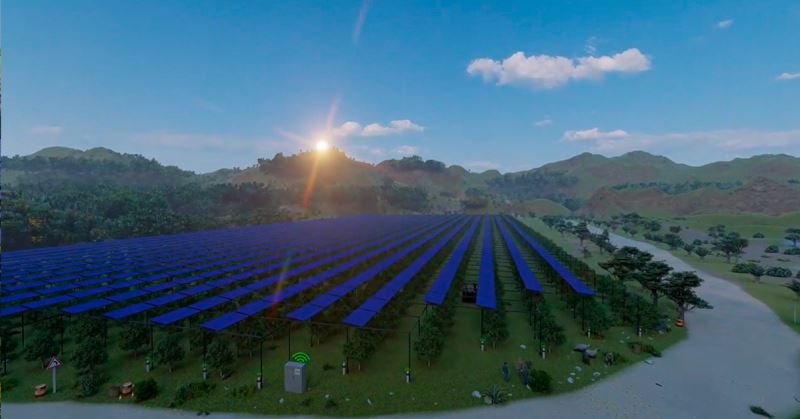AgriLight Energy Systems
Transforming agricultural fields into energy fields
68% of funding target
Highlights
Highlights
Maximizing Electricity Generation while Optimizing Crop Production
Agri-Light aims to implement advanced agrivoltaic technology in a practical way, maximizing energy generation and crop cultivation on shared land. The company's cutting-edge technology helps farmers increase their yields, reduce their water consumption, and generate clean energy. The system uses a dynamic algorithm to control the shading level of the solar panels, allowing them to optimize the amount of sunlight that reaches the crops, while still maximizing electricity production.
.jpg)
PCT Patent on Innovative Smart Agrivoltaic System
Agri-Light holds a PCT patent for its pioneering Smart Agri-PV System, which is the only agrivoltaic system focused solely on the massive multi-billion fruit & nut orchard market.
Financial Grants and Successful Demonstrations
Agri-Light stands out as the only company to receive a financial grant from the Israeli Ministries of Energy and Agriculture to install a demonstration project of their agrivoltaic technology. The project, currently installed above a grape vineyard in the Ramat Negev, is accompanied by an agronomic study conducted by agricultural R&D scientists from Ramat Negev. The study aims to showcase the advantages of the company's technological solution and its unique contribution to creating an optimal agricultural environment for the grape vineyard.

Preliminary studies conducted in southern France demonstrate the technological feasibility of integrating agri-voltaic systems above grape vineyards. The success of the company's technological pilot in Ramat Negev will be publicized, generating substantial international exposure for its solution. This success will further enhance the company's activities in Israel and worldwide.
Securing Investments from French Electricity Giant EDF and Israel Innovation Authority
Agri-Light is supported by EDF, the national electricity company of France, whose innovation arm - ESIL - has invested in the company alongside the Israel Innovation Authority.

Global Expantion: Pilots and Strategic Projects in Israel, Europe, USA, and South Africa
Agri-Light's marketing strategy is centered on the implementation of strategic pilots in markets where the regulatory environment is conducive and the market potential is significant. The company aims to establish these pilots, utilizing the services of local researchers to evaluate the contribution of Agri-Light's agricultural solution to plantations. This emphasis is particularly on countries like Israel, Italy, and Spain, where there is a suitable regulatory maturity for agri-voltaic fields.
The marketing efforts will target potential customers such as solar entrepreneurs, landowners, and farmers who will visit the pilot sites and recognize the benefits of installing the SAPV above their orchards and vineyards. The presence of agronomic R&D studies by leading agricultural researchers, who will thoroughly accompany the pilots established in Israel, presents a double business opportunity. This includes showcasing the system's advantages for precision agriculture and the need for international publication of research results, which will highlight the system's advantages to leading factors globally.
Israel
At the end of 2021, the company won a national tender by the Ministries of Energy and Agriculture, to establish up to 12 pilots in various agricultural crop plantations in Israel. To this end, agreements have been signed with agricultural landowners and a publicly traded Israeli energy company to fully finance the planning and construction costs of these pilots.
Furthermore, the company has signed a significant agreement with another Israeli energy company to promote the planning and construction of two major projects in Israel, with an aggregate capacity of up to 100 MW.
One of these projects is located in the Tkuma region, surrounding the Gaza Strip, which the company believes has significant national, strategic, and business value. As a result, the company expects to expand to additional projects in the next 3-5 years in the Tkuma area and in northern Israel, with a capacity similar to the two aforementioned projects.
.png)
Italy and Spain
Agreements have been signed with an Italian-owned company to establish pilots and strategic projects in Italy. The company is also in advanced negotiations for a pilot in a strategic location in Spain, with a local Spanish partner.
In Spain, the SAPV system is expected to help farmers increase agricultural output, while also benefiting from the income of renting out their land for pilots and the sale of solar energy. The immediate expansion potential of the strategic pilot in Spain is for projects with an aggregate capacity of at least 50 MW that will be established over the next three years.
France
Agri-Light has business cooperation with EDF, the national electric company of France, which is among the investors in the company's SAFE, through the innovation arm of EDF in Israel. The company anticipates that with its business development, the cooperation with EDF may also expand, including the establishment of photovoltaic agricultural projects in France.
Expansion into South Africa and Kenya
Agri-Light has signed an agreement with one of South Africa's largest agricultural concerns to partner in delivering stable renewable energy to rural farmers. This collaboration also focuses on improving crop production through Agri-Light's Smart Agri-PV solutions. Furthermore, the company has been offered the opportunity to implement its solution over 13.5 hectares within the new "Smart City" development in Kenya, known as Konza Technopolis. This venture will serve as a high-profile model for solar energy and agriculture, contributing to electricity generation and precision agriculture in the region.
Agri-Light is also conducting negotiations to establish pilots in South Africa and the USA.
Pitch
Pitch
As the global shift towards solar energy gains momentum, one of the challenges we face is the significant land footprint required for traditional solar panel installations. This can potentially encroach upon valuable agricultural land that could be utilized for food production.
To address these challenges, agrivoltaics emerges as a promising solution. Agrivoltaics, also known as agrophotovoltaics or dual-use solar, involves the simultaneous utilization of land areas for both solar power generation and agriculture.
By strategically integrating solar panels into agricultural areas, agrivoltaics enables the coexistence of crop production and solar energy generation. This approach optimizes land utilization and offers numerous benefits. It promotes resource efficiency by making the most of available land and mitigates the need for additional space for solar panel installations.
Agrivoltaics also provides additional advantages such as reducing water evaporation from crops through panel shading, improving crop yields through the creation of a favorable microclimate, and contributing to the sustainable generation of renewable energy.
Deploying it on just 1% of the world's cropland could generate the entire global electricity demand, supporting the energy transition.
The Challenge
The fundamental challenge that exists in all Agri-PV technologies is the inherent competition for sunlight between the needs of agricultural crops for their photosynthetic process and the demands of solar systems for generating electricity.
- When the solar modules follow the sun, they cast shade over agriculture, which harms the crops.
- When the solar modules pointing the sun, crops are getting the sunlight they need, but there is no electricity generation at this time.
.png)
* The following graph by Fraunhofer Institute (Intersolar Conference 2022) shows a negative slope between PV Score and Agricultural Score for existing Agri-PV technologies This negative slope is due to the inherent competition on sun radiation.
.png)
* The Agri-PV Industry Challenge is maximizing Energy generation without harming agriculture and vice versa.
The Existing APV Technologies and their limitations
.png)
- In Static APV systems, shading from PV panels can harm agriculture so large gaps are left between PV panels and rows to minimize harm, which means they produce less electricity per unit area.
- In Dynamic APV systems, shading from PV panels can harm agriculture, to mitigate this, the panels are rotated towards the sun resulting in lower electricity production.
- In Semi-transparent APV systems, the solar panels generate less electricity per unit area compared to opaque ones.
- In Vertical APV systems, solar panels have a lower electrical conversion efficiency, which means they produce less electricity per unit area.
The Solution
Agri-Light has developed a unique technology featuring mobile panels that incorporate an algorithm and IoT sensors. These smart-systems effectively manage the intensity of radiation required for optimal crop cultivation by precisely positioning the panels.

Agrilight’s Agri-PV Technology Highlights
- An innovative Agri-PV technology that addresses the competition between agriculture and energy generation and overcomes the Agri-PV challenge. The only available APV solution that simultaneously enhances crop growth and solar energy generation.
- Agrilight's APV technology enables horizontal movement of PV panels on rails above trees to effectively manage shading between trees and service aisles
- Redirect PV panel shade to service aisles between trees to let sunlight reach crops and redirect shade back to trees during hot weather
- The solar panels will shield the trees to protect them from rain, hail, and snow.
- The system tracks the movement of the sun to optimize the generation of electricity.
- Proprietary and patent-protected technology
.png)
The PV panels will be dynamically adjusted horizontally throughout the day to ensure that sunlight reaches the trees and that shade from the PV panels falls on service passages, regardless of the sun's movement.
.png)
Agrilight’s Agri-PV Technology Provides Protection from Extreme wheatear conditions
- Limiting excess solar radiation and high temperatures: controlled shading can reduce the temperature of the trees by up to 5°C
- Reducing frost risks: The PV panels can be horizontally shifted over the trees to act as a thermal blanket that protects the crops from frost, hail, and snow by increasing the temperature of the trees by up to 3°C
- Saving irrigation Water: a 30- 40% reduction in water evaporation
.png)
Maximizing Energy Generation without Harming Crops
Combination of rotary sun tracker with linear motion maximizes energy generation without harming crop quality and yields:
- A single-axis sun tracker can increase electricity production by up to 30% compared to static systems, depending on geographic location, azimuth of PV panel rows, and tilt angle of static panels.
- In order not to harm the crops, the linear motion of the rotary tracker will divert the shade falling from the PV panels on the trees to the passages between the trees.
.png)
Real-Time Data Application
.png)
Smart Agri-PV (SAPV) Control Algorithm
.png)
Smart Agri-PV (SAPV) Optimization Platform
.png)
Agrilight’s Value Proposition
.png)
Team
Team
|
Brings over 20 years of experience as a technological entrepreneur. He has a track record of establishing successful start-up companies, driving them to technological and business maturity, developing markets, and raising capital.
|
|
Previously served as a CIA officer in the Air Force and later as CEO of the Adeltec Group for 17 years. During his tenure, he was involved in the initiation and development of natural gas-based power plants.
|
|
Responsible for Regulation, Licensing, and Planning. With 40 years of experience, Zohar previously held the position of Licensing, Statutory, and Assets Manager at an electricity company. Currently, he works as a private consultant specializing in Statutory, Regulation, and Licensing matters.
|
|
With a master‘s degree in physics, he has amassed over 30 years of experience in engineering management and technology development. Yossi‘s expertise lies in the fields of semiconductors and energy.
|
|
He previously served as the Deputy Director of the Government Companies Authority at the Ministry of Finance. Aharon also represented the government on the Board of Directors of the Electric Company and other infrastructure companies in the energy and transportation sectors.
|
|
He is an electrical engineer from Switzerland and has previously worked at Intel as an equipment maintenance engineer for five years.
|
|
Previously, he managed innovation programs for technology companies at the accounting firm EY. Amir also held a senior position at a technological solutions company in the water sector.
|








